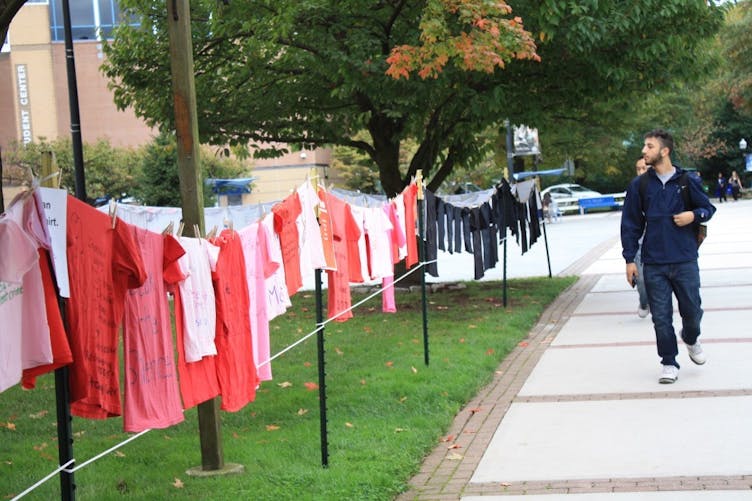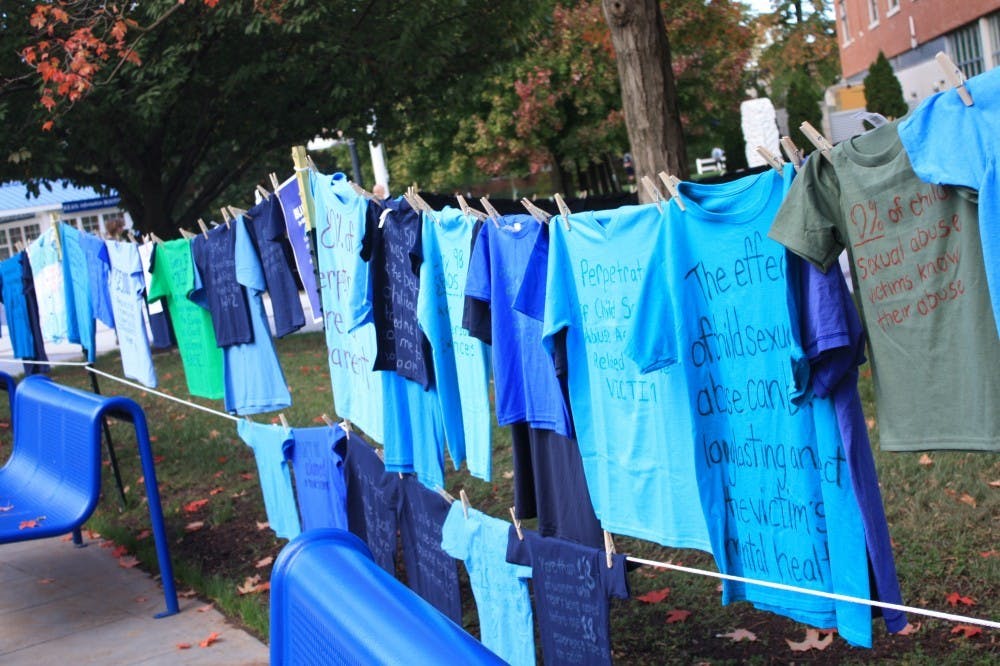Kean University is always striving to bring awareness to many issues impacting students and its community.
The Center for Interdisciplinary Studies, the Human Rights Institute, and Lambda Theta Alpha placed over 250 shirts outside on the Miron Student Center (MSC) patio to help educate and raise awareness about domestic and intimate partner violence, Wednesday Oct. 25 from noon to 8 p.m.
The Clothesline Project is a vehicle for victims to express their emotions and share their stories of abuse, words of encouragement to others by decorating each shirt. The shirts are hung on a public clothesline for everyone to view and it is a visual testimony to the reality of domestic and intimate violence in our community.
- Domestic violence survivors are strong
- On a typical day, more than 20,000 phone calls are placed to domestic violence hotlines nationwide
- Only about 38 percent of children disclose sexual abuse
- Break the silence
The many different colors such as purple, yellow, red, pink, white, black, brown/gray, blue, green and orange may have just looked like normal hues showcasing the patio, but they held more important meanings.
- Purple: survivors of attacks suffered due to perceived sexual orientation
- Yellow: survivors of physical assault and/or domestic violence
- Red/Pink/Orange: survivors of rape or sexual assault
- White: people who have died as a result of violence
- Black: those who are disabled as a result of an attack or assaulted because of a disability
- Brown/Gray: survivors of emotional, spiritual or verbal abuse
- Blue/Green: survivors of incest or childhood assault

Dr. Sara Compion, director of Interdisciplinary Studies and Coordinator of the Human Rights Institute, shed a light on the event and how she wanted students to understand and become educated about the importance of domestic and intimate partner violence.
"We are trying to both educate and spread awareness about issues in our community and in our lives, as our student and faculty are affected by these issues and sometimes we need to see it and air our dirty laundry. We need to be supportive of each other and so some of the messages here are messages of support. So we care for you and are here for one another. We shouldn't hide away in our private domestic violence."
When explaining why she would want students to stop by and how students can learn about the meaning behind the shirts, Compion submitted a pitch that she believed would interest students.
"We should understand that people have things going on in their private lives so when you see someone, you do know what's going on in that domestic realm and private space. Sometimes making that private public is meaningful because it helps us reflect on our own private lives."
Compion wanted the Kean community to realize that it was not only she who was a part of the process or developed the idea for the clothesline project but that many people and groups committed to making this project successful.
"There are quite a number of parties that I like people to get to know which include the Center for Interdisciplinary Studies which are the women's studies students, the Human Rights Institute and their students, Lambda Theta Alpha have done all the white [t-shirts]. They're a Latin sorority on campus and they have been doing this for years. It was great to partner with them, also Student Government and the Counseling Center and PULSE which is one of the groups in Student Organization. Since they are having the walk this evening, we're working in partnership."
Compion wanted students to walk away from the event with a sense that they are not alone and understand that they do go through things in life but there are other people who experience much of the same issues.
"There is a community of support not just at Kean but there are plenty of resources that we are trying to give away. And there are so many resources in the community that are accessible to students so they should be aware and know when something is wrong."

Compion admitted to doing the clothesline project on the MSC patio for many reasons, one being the exposure that the shirts would receive.
"Originally we wanted to line the whole walk with shirts which would be 2500 shirts but we have here 250 shirts. So it was more about where we could have it, where there were students and where there would have a visual and audio impact. We want to communicate the message!"
It is essential for students to understand that dating can result in an intimate partner violence case because no one is safe. Understanding the difference between what is safe and what is not safe can affect the outcome of a shirt color either being purple or white color.
"When we think about domestic violence, we think about somebody else's home, but if you think about intimate partner violence, you think of men and women who are affected and are also perpetrators not just victims. It can happen in a relationship like boyfriend and girlfriend, or girlfriend and girlfriend or boyfriend and boyfriend on campus. That's intimate partner violence too and it can happen in terms of your dating life. Domestic doesn't just mean home."
When speaking of domestic violence there can be a stigma on who can be affected and where a case of domestic violence can occur.
"No one wants to feel like they are in a domestic violence and that's part of our message. If you seek help, you can be empowered to move beyond just being a victim but being a survivor who can remain a positive member of society. The more you see, the more you are aware of something, the less it becomes stigmatizing."
Sarah Robert, a junior studying early childhood education and history, and Ciara Williams, a sophomore studying psychology, both wanted to explain what the event meant to them and how they felt the shirts would impact others.
Robert: My mother was a victim of domestic violence so I grew up a little bit around that, so I figured I would help out. I think just looking at it and realizing the statistics and how pervasive it is might trigger something and might be more aware of it. There is a stigma that domestic violence by a woman is always by a stranger but more often, it is by someone at home, who intimately knows her.
Williams: I love the concept, I love the colors and I like how it is right at the center of campus. I did this last year and I love how it makes people go out of their comfort zone and talk about it. I really appreciate that because people don't want to talk about it. People's voices can be heard and that's important.
There are always people here to help, stay educated!







